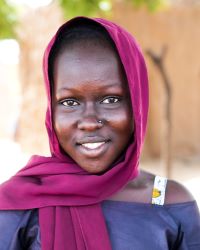Djogorame in Mali

Photo Source:
manothegreek
|
Send Joshua Project a map of this people group.
|
| People Name: | Djogorame |
| Country: | Mali |
| 10/40 Window: | Yes |
| Population: | 65,000 |
| World Population: | 65,000 |
| Primary Language: | Fulfulde, Maasina |
| Primary Religion: | Islam |
| Christian Adherents: | 0.00 % |
| Evangelicals: | 0.00 % |
| Scripture: | New Testament |
| Ministry Resources: | Yes |
| Jesus Film: | Yes |
| Audio Recordings: | Yes |
| People Cluster: | Mande |
| Affinity Bloc: | Sub-Saharan Peoples |
| Progress Level: |
|
Introduction / History
The Djogorame people are a small ethnic group residing in the remote regions of central Mali. Historically, they have lived in relative isolation, which has allowed them to preserve much of their traditional culture and language. Their origins are linked to the broader Mande-speaking groups, with whom they share linguistic and cultural ties. Over time, the Djogorame have adapted to the harsh environment of the Sahel, developing unique survival strategies that distinguish them from neighboring communities. The speak a Soninke language.
What Are Their Lives Like?
The Djogorame live in tightly-knit communities where agriculture and pastoralism form the backbone of their economy. They cultivate millet, sorghum and beans, crops that are well-suited to the arid conditions of the region. In addition to farming, they raise livestock, including goats and cattle, which provide both sustenance and economic security. Family life is central to Djogorame society, with extended families often living together in compounds. Social structures are hierarchical, with elders holding significant authority and respect within the community. Traditional ceremonies, such as those marking the agricultural cycle or significant life events, play a crucial role in maintaining social bonds and passing on cultural knowledge.
What Are Their Beliefs?
The Djogorame practice a blend of traditional animist beliefs and Islam, reflecting the historical influence of Islam in the region. Their animist practices include rituals to honor ancestors and spirits believed to inhabit the natural world. They perform these rituals to ensure the well-being of the community and the fertility of the land. Alongside these traditional beliefs, the Djogorame observe Islamic practices such as daily prayers, fasting during Ramadan and participation in Islamic festivals.
What Are Their Needs?
The Djogorame face significant challenges due to their remote location and the harsh environment of the Sahel. Access to basic services such as healthcare, education and clean water is limited. The region's vulnerability to climate change, particularly drought and desertification, exacerbates these challenges, threatening their agricultural and pastoral livelihoods. Additionally, the Djogorame's cultural heritage, including their language and traditional practices, is at risk of erosion due to external pressures and the encroachment of dominant cultures.
Prayer Points
Pray the hearts of the Djogorame people would be stirred to hunger after God, to drink of living water.
Pray for family-based Disciple Making Movements to soon transform Djogorame society, blessing them spiritually and economically.
Pray for the Lord to move in the hearts of believers to give up their own rights and sacrifice their lives to see the Djogorame people blessed by the work of Jesus Christ, the only savior.